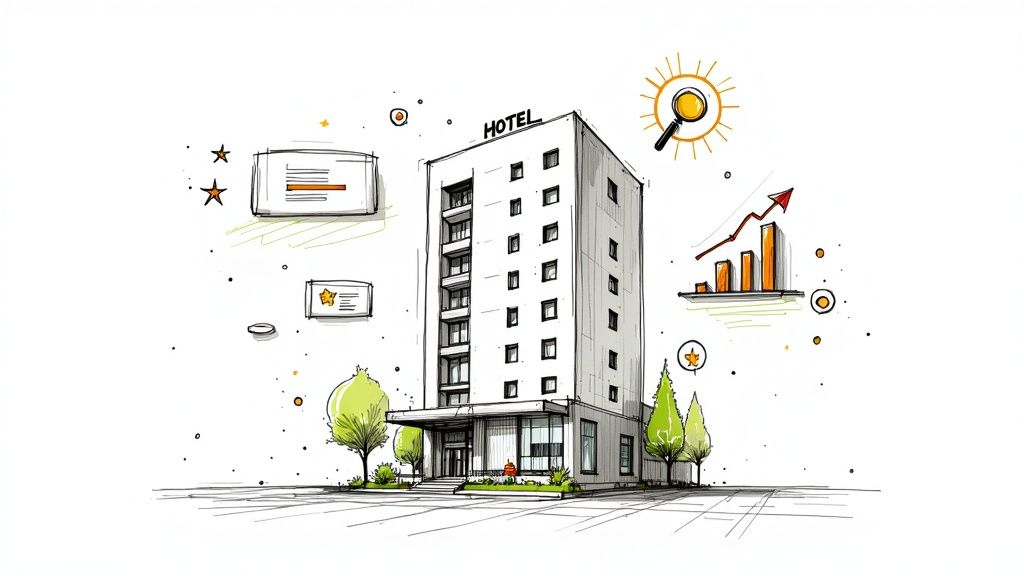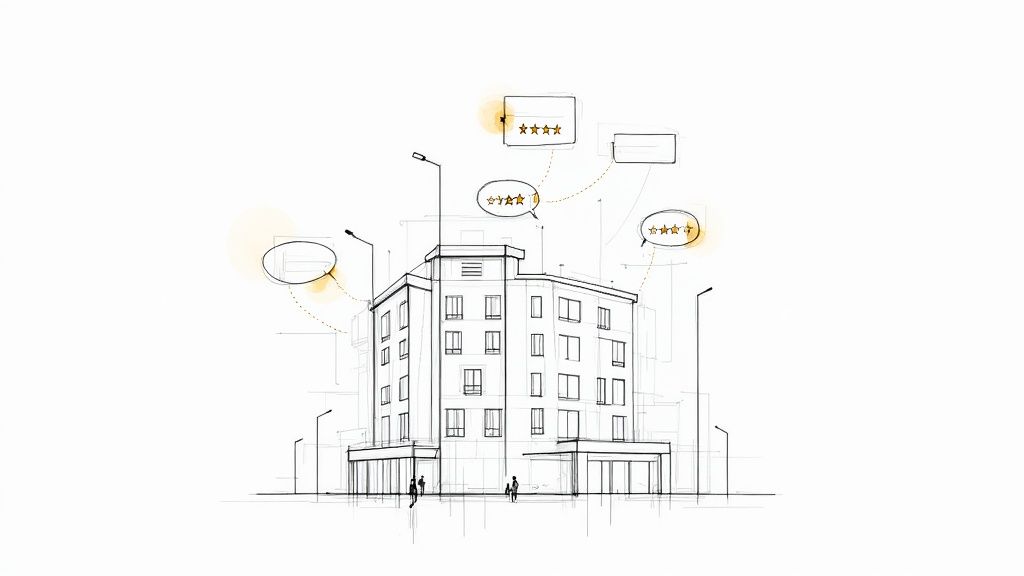
online reputation management for hotels
Online Reputation Management for Hotels | Boost Your Success
Posted on Oct 4, 2025

Managing your hotel's online reputation is all about monitoring, influencing, and guiding the conversation around your property across the web. This isn't just about damage control or responding to the occasional bad review. It’s a fundamental business strategy that directly shapes public perception, builds trust with potential guests before they even think about booking, and ultimately drives revenue.
Why Your Online Reputation Is Everything

Let's be real: your hotel's reputation is built long before a guest ever walks through your doors. It’s forged on platforms like Google, TripAdvisor, and Booking.com, where every single review tells a story to countless future travelers. This reality elevates online reputation management from a simple marketing task to a core business function.
Think of guest feedback as modern-day word-of-mouth, but amplified on a global scale. Each star rating, every detailed comment, contributes to a public narrative that can either fill your rooms or send travelers clicking over to your competitor down the street.
The Direct Impact on Your Bottom Line
When you get proactive about managing your reputation, guest reviews transform into one of your most powerful assets. They provide the social proof that justifies higher room rates and builds a level of trust that no flashy "book now" button can replicate. This isn't about an impossible quest for a perfect five-star rating everywhere; it's about owning your hotel's story in a very crowded market.
Consider the real-world impact:
- Booking Decisions: A strong collection of positive, recent reviews is often the tie-breaker that makes a traveler choose you over a similarly priced competitor.
- Revenue and ADR: Hotels with higher review scores can consistently command a higher Average Daily Rate (ADR). Why? Because guests are willing to pay a premium for a trusted, quality experience.
- Occupancy Rates: A stellar online reputation boosts your visibility on OTAs and in search results, which naturally leads to more eyes on your property and, you guessed it, higher occupancy.
This isn't just a theory. It's projected that by 2025, over 90% of travelers will depend on online reviews before booking a hotel. This makes your digital footprint a critical lever for occupancy and revenue. Platforms like Google are particularly powerful, as ratings are front-and-center in both Search and Maps, directly influencing who clicks through to your booking site.
The reality is that your reputation has become more valuable than your brand identity. Travelers place more weight on recent guest ratings than on a well-known hotel name.
To get a clearer picture of what a comprehensive strategy looks like, here's a breakdown of the core components.
Core Pillars of Hotel Reputation Management
A summary of the essential components for a successful online reputation strategy.
| Pillar | Objective | Key Platforms |
|---|---|---|
| Review Monitoring | To stay informed about new guest feedback in real-time and identify trends in guest sentiment. | Google, TripAdvisor, Booking.com, Expedia |
| Guest Engagement | To respond to all reviews (positive and negative) promptly, professionally, and personally. | All major review sites and social media |
| Reputation Building | To proactively encourage satisfied guests to leave positive reviews and improve overall ratings. | Post-stay emails, on-site reminders |
| Operational Improvement | To use guest feedback as a tool to identify and address operational issues, enhancing the guest experience. | Internal feedback systems, team meetings |
Ultimately, a well-managed reputation means you're no longer just a passive observer of guest feedback; you become an active participant in the conversation.
Taking Control of the Narrative
Getting a handle on your online reputation means you're in the driver's seat. Exploring some practical and simple online reputation management tips can offer some great starting points. By engaging thoughtfully with feedback, you send a powerful message about your commitment to guest satisfaction—a message that resonates with both past guests and future prospects, turning their input into a cycle of continuous improvement and, ultimately, greater profitability.
Mastering Your Digital Footprint

You can't manage conversations you don't even know are happening. When we talk about online reputation management for hotels, most people immediately think of TripAdvisor and Google. But that's just the tip of the iceberg.
Potential guests are out there right now—on niche travel blogs, in local forums, and deep in social media threads—talking about their travel plans and forming opinions. Your hotel’s name could pop up anywhere, at any time. Trying to track all of this manually is a recipe for disaster. To stay on top of it, you need a proactive monitoring system that ensures no piece of feedback ever slips through the cracks.
Building Your Digital Radar
First things first: automate your monitoring. Forget about the daily grind of manual searches. The most efficient way to cast a wide net is by setting up smart alerts that catch any mention of your property across the web. Think of it as an early warning system for both positive buzz and brewing problems.
You can actually start with some powerful, free tools that will deliver mentions straight to your inbox. This simple shift takes your strategy from reactive to proactive, giving you a much clearer picture of how your hotel is perceived online.
- Google Alerts: This is your foundation. Set up alerts not just for your hotel's name, but also for common misspellings. It’s also a smart move to monitor the names of key staff, like your general manager or head chef.
- Social Mention: This tool zeroes in on social media, blogs, and news sites. It gives you real-time search results for your keywords, making it perfect for gauging sentiment on platforms like X (formerly Twitter) and Reddit where conversations move fast.
The core idea is that reputation management is a continuous cycle of monitoring, addressing feedback, and actively shaping public perception. It isn't a "set it and forget it" task; it demands consistent effort to maintain a positive online presence.
Choosing the Right Management Tools
While free alerts are a fantastic starting point, dedicated reputation management platforms offer a far more powerful solution. These tools are designed to pull reviews from dozens of sites into a single dashboard, often providing sophisticated sentiment analysis and even competitor benchmarking.
Your digital reputation is the sum of every touchpoint a guest has with your brand online. A centralized tool gives you the control to not only see the full picture but also to shape it effectively.
When you're looking at paid tools, think about what your hotel actually needs. A small boutique inn won't require the same heavy-duty feature set as a massive resort with multiple restaurants and a spa.
Look for platforms that offer these key features:
- Centralized Review Dashboard: This is a must-have. It should pull in reviews from all the important places—OTAs, Google, social media—so you can see everything in one spot.
- Sentiment Analysis: The best tools automatically tag reviews by topic (like "cleanliness," "service," or "amenities") to help you quickly spot your operational strengths and weaknesses.
- Competitor Tracking: It’s incredibly useful to see how your ratings and review volume stack up against your local competition. This gives you context and helps you set meaningful goals.
This monitoring framework isn't just for traditional hotels, either. If you're managing vacation rentals, building a strong brand is crucial for steering guests away from OTAs. Learning how to build a successful direct booking website for your Airbnb is a vital step, and managing the reputation of that site is every bit as important.
Crafting Review Responses That Win Guests

Let's get one thing straight: every single response you post to a guest review is a piece of marketing. It’s a live, public demonstration of your hotel’s service ethos, and it’s being watched by thousands of potential guests who are right in the middle of deciding where to book. This is where the rubber meets the road in online reputation management for hotels.
Moving beyond stale, templated replies isn't just a good idea—it's essential. A generic "Thank you for your feedback" or "We're sorry for the inconvenience" just doesn't cut it anymore. It feels cold, impersonal, and can do more harm than good. The real goal is to respond with a genuine, human touch that builds trust and makes future guests feel confident they’re making the right choice.
This isn’t just theory; it directly impacts your bottom line. Research shows that a whopping 77% of travelers are more likely to book a hotel when they see management actively and thoughtfully responding to reviews. It shows you’re listening and you care. If you want to dive deeper, you can discover more insights about guest booking behavior from this study.
Transforming Negative Reviews into Opportunities
When a negative review pops up, the gut reaction is often to get defensive. Fight that urge. Instead, look at it as a golden opportunity to showcase your problem-solving skills and dedication to guest satisfaction. Honestly, a well-handled negative review can be more convincing to a potential guest than a dozen generic positive ones.
The key is to de-escalate the situation publicly while showing real empathy and ownership.
Here’s a simple, proven framework for your response:
- Acknowledge and Empathize: Kick things off by thanking the guest and specifically acknowledging their frustration. Something like, "I'm so sorry to hear your experience with our breakfast service didn't meet your expectations," shows you've actually read and understood their complaint.
- Take Ownership: Avoid the blame game. Even if there were extenuating circumstances, a simple, "This is not the standard of service we aim to provide, and I sincerely apologize," goes a long way.
- Move the Conversation Offline: The public review section is not the place for a back-and-forth debate. Offer a direct line of contact, like a manager’s email or phone number, to resolve the issue privately. This signals to everyone reading that you take a hands-on approach to making things right.
This strategy turns a public complaint into a powerful testament to your hotel’s commitment to its guests.
Amplifying the Power of Positive Reviews
Responding to happy guests is just as crucial, but it requires a different playbook. Here, the goal is to reinforce their great experience, personalize your thanks, and subtly nudge them toward a return visit. Don’t just drop a "thanks"—amplify what they loved.
When you personalize a response to a positive review by mentioning specific details, you're not just thanking one guest; you're highlighting your hotel's best features for every future traveler who reads it.
Imagine a guest raves about your front desk staff by name and mentions how much they loved the poolside cocktails.
- Before (Generic): "Thank you for the great review! We hope to see you again soon."
- After (Personalized): "Thank you so much for your kind words! Maria is indeed a star on our team, and we're thrilled you enjoyed the poolside cocktails—the sunset view from there is one of our favorites, too. We can't wait to welcome you back for another relaxing stay."
That small tweak makes the original guest feel truly seen and appreciated. More importantly, it subtly advertises your amazing staff and fantastic amenities to everyone else reading. It's a tiny effort that pays huge dividends for your reputation.
To help you put this into practice, here’s a quick guide for handling different types of feedback.
How to Respond to Different Guest Reviews
This table offers a practical comparison for handling various types of guest feedback to maximize your positive reputation.
| Review Type | Primary Goal | Key Elements of Response | Example Snippet |
|---|---|---|---|
| Glowing Positive | Reinforce & Amplify | Thank them, mention specific details they praised, and invite them back. | "We're so glad you loved the harbor view from your room! We can't wait to welcome you back for another wonderful stay." |
| Mixed (Good & Bad) | Acknowledge Both & Show Improvement | Thank them for the praise, apologize for the shortcomings, and state what you'll do to fix it. | "Thank you for your feedback. We're happy you enjoyed our pool but sorry the Wi-Fi was slow. We're upgrading our system next month." |
| Generally Negative | De-escalate & Resolve | Apologize sincerely, take ownership without excuses, and offer to resolve the issue offline. | "This is not the standard we strive for. Please contact me directly at manager@hotel.com so I can personally address this." |
| Angry or Detailed Complaint | Empathize & Take it Offline Immediately | Show empathy for their frustration, avoid a public debate, and provide a direct contact for a private resolution. | "I am very sorry to read about your frustrating experience. This is certainly not our standard. Please call me at [phone number] to discuss this further." |
Remember, consistency is key. A thoughtful, human response to every review—good, bad, or mixed—sends a powerful message that you value your guests and are committed to providing an exceptional experience.
Using AI to Improve Guest Experiences

Let's be honest: manually reading every single guest review is no longer a viable strategy. As feedback pours in from dozens of platforms, the sheer volume is overwhelming. Important insights get buried, and opportunities are missed.
This is where AI-powered tools are completely changing the game for online reputation management for hotels. They cut through the noise, turning a flood of unstructured data into a clear roadmap for real, tangible improvements.
Instead of your team spending hours sifting through comments, you can now get an instant, high-level understanding of what guests are really saying. This technology goes far beyond simple star ratings, performing deep sentiment analysis to pinpoint the specific emotions and topics that are either helping or hurting your scores.
From Raw Data to Actionable Insights
Imagine this: your dashboard flags a recurring negative sentiment tied to "Wi-Fi" and "third floor." AI can spot this pattern from hundreds of reviews in seconds. Suddenly, you're alerted to a specific, fixable problem that might have otherwise simmered for months, dragging down your ratings. It’s a huge leap from relying on anecdotal evidence from staff meetings.
The same tools can also shine a spotlight on what you’re doing right. What if reviews consistently praise a front desk agent named Sarah for her "warm welcome" and "helpful attitude"? That's not just a nice comment—it's a powerful data point. You can now recognize a top performer and use her approach as the gold standard for your team's training.
This kind of technology aggregates feedback from across the web, giving you one unified, crystal-clear view of your reputation. And that matters, because this feedback has a massive impact on your bottom line. A recent study found that 81% of travelers frequently or always read reviews before booking a hotel.
This trend has pushed smart hoteliers to adopt AI that can quickly make sense of feedback from Google, TripAdvisor, and the OTAs. You can read the full study about traveler behavior on HospitalityNet.org.
The real magic of AI in reputation management isn't just about saving time. It's about drastically shortening the feedback loop between a guest complaint and a lasting operational fix. That’s how you get a serious competitive edge.
Practical Applications for Your Hotel
When you start treating guest comments as structured data, you can make smarter, faster decisions. It’s about being proactive instead of reactive, and allocating your resources where they’ll make the biggest impact.
Here are just a few real-world ways to put this into practice:
- Smarter Capital Improvements: If sentiment analysis consistently shows negative feedback about "outdated bathrooms" or "uncomfortable beds," you finally have the hard data you need to justify that renovation budget to ownership.
- Focused Staff Training: When positive reviews repeatedly mention the "quick and easy check-in process," you know that's a key strength. Double down on it and make it a central part of your training materials.
- Authentic Marketing Messages: Discovering that guests are raving about your "quiet location" or "amazing family-friendly pool" gives you proven selling points. These aren't just guesses; they are authentic, guest-validated features to build your marketing campaigns around.
These AI-driven insights are invaluable for any hospitality business, including short-term rentals. If you want to dive deeper into automation, our guide on how to use AI to automate your short-term rental business is packed with more ideas.
Ultimately, by letting technology handle the data crunching, your team is freed up to focus on what truly matters: implementing changes that create unforgettable guest experiences.
How to Proactively Generate Positive Reviews
Waiting around for reviews to just show up is a recipe for a mediocre online reputation. Let’s be honest, the most effective online reputation management for hotels is an active game. You need a proactive approach that turns your happiest guests into your biggest fans and most powerful marketers.
When you have a steady stream of fresh, positive feedback flowing in, it does more than just boost your overall rating. It also creates a powerful buffer that softens the blow from that one inevitable, unavoidable negative comment.
The trick is to encourage feedback without ever coming across as pushy or desperate. It all starts with knowing when to ask—right when the guest's positive feelings about their stay are at an all-time high. Then, you have to make the actual process of leaving the review as absurdly simple as possible.
The Art of the Ask: Timing Is Everything
Nailing the timing of your review request is absolutely critical. Ask too early, and you'll seem intrusive. Wait too long, and the warm, fuzzy glow of their fantastic stay starts to fade. You want to catch them while all those great memories are still fresh in their minds.
- Post-Stay Emails: This is the classic for a reason—it works. Send a personalized email within 24-48 hours of checkout. A simple "thank you for staying with us" goes a long way, especially when you include a direct, one-click link to your preferred review site, like Google or TripAdvisor.
- On-Site Opportunities: Don't sleep on the power of a good old-fashioned face-to-face conversation. Train your front desk and concierge staff to spot genuinely happy guests. A simple, friendly, "We're so glad you enjoyed your stay! We'd be so grateful if you shared your experience online" can be incredibly effective when it comes from a place of genuine warmth.
Here's a simple rule of thumb: If a guest offers you unsolicited praise during checkout, that's your cue. Empower your staff to act on these moments. Have small cards ready with a QR code that links them right to your review profiles.
Making It Effortless for Your Guests
The easier you make it for someone to leave a review, the more likely they are to follow through. Think about it—every single extra click, every extra search they have to perform, dramatically lowers your chances of getting that review. Your whole strategy should revolve around removing every possible bit of friction.
This means you need to provide direct links. Don't just say, "Review us on Google." Give them a link that takes them straight to the review submission window. It’s a tiny detail, but it can make a massive difference in your conversion rate. The same logic applies no matter what kind of property you're running; our guide with tips for hosting on Airbnb dives into how a smooth, frictionless guest experience is the foundation for getting better feedback.
Leverage the Power of User-Generated Content
Look beyond the traditional star ratings and text reviews. Encourage your guests to share their own photos and videos on social media. This kind of authentic content is pure gold—it’s powerful, trustworthy social proof.
For hotels, understanding Travel User-Generated Content is key to turning these genuine guest moments into valuable marketing assets. You can get the ball rolling by running a contest for the best guest photo or simply by re-sharing their posts (with their permission, of course). It’s a win-win.
Your Top Reputation Questions, Answered
When you're in the thick of managing a hotel's online reputation, questions are bound to pop up. This isn't just about damage control; it's a core part of your marketing and guest relations strategy. Let's tackle some of the most common questions I hear from hoteliers.
Should I Really Respond to Every Single Review?
The short answer is yes, but you need to be smart about it. Responding to 100% of your negative reviews is absolutely non-negotiable. It shows everyone—the unhappy guest and future lookers—that you take feedback seriously and are committed to fixing problems.
For positive reviews, it's about building relationships. You don't need a templated "thank you" for every single one. Instead, focus your energy on personalizing replies to the most recent and detailed positive reviews. This does two things: it makes the original poster feel genuinely appreciated and it highlights your hotel's best features for anyone else reading. The real goal here is consistent, thoughtful engagement.
A Negative Review Just Came in. How Fast Do I Need to Act?
You need to be quick. My rule of thumb is to respond to all negative feedback within 24 hours. A speedy reply sends a powerful message that you're on top of your game and that you genuinely care about the guest experience.
If you let a negative review sit for days, it looks like you're either ignoring the problem or, worse, don't care. That silence can make an already frustrated guest even angrier and it definitely doesn't look good to potential customers scrolling through your page.
A fast, empathetic response can completely change the narrative. I've seen it countless times—a quick, accountable reply turns a detractor into a advocate. It’s one of the most powerful marketing moves you can make.
Can I Get a Fake or Malicious Review Taken Down?
It's possible, but you'll need to be persistent. Platforms like Google and TripAdvisor have clear policies against fake or defamatory content. If you're certain a review violates their rules, your first step is to flag it through their official process.
When you report it, arm yourself with as much evidence as you can. If you have zero record of a guest with that name staying on the dates they mentioned, say so. But be prepared for a wait. These things take time, and there's no guarantee the platform will see it your way. In the meantime, post a calm, professional public response stating you're taking the matter seriously and investigating their claims.
With So Many Sites, Which One Should Be My Top Priority?
While you need a broad view, Google is king. Think about it: your Google Business Profile is often the very first impression a potential guest has of your hotel. Your rating and snippets of reviews show up right there in search results and on Google Maps, long before they ever click through to your website.
After locking down your Google strategy, look at where your bookings come from. For most hotels, this means TripAdvisor and the big OTAs like Booking.com and Expedia. Solid online reputation management for hotels means being hyper-visible and responsive right where your customers are making their decisions.
Ready to take control of your property's reputation and drive more direct bookings? hostAI provides the tools you need to build a powerful online presence, from intelligent websites to automated marketing. See how we can help you grow.